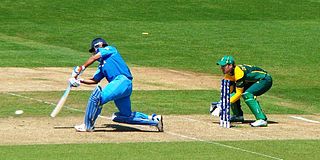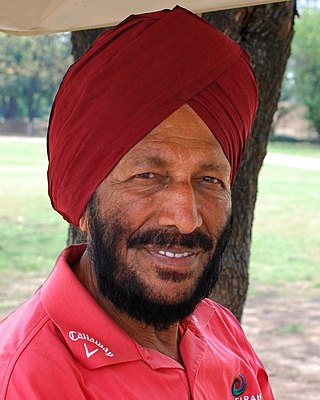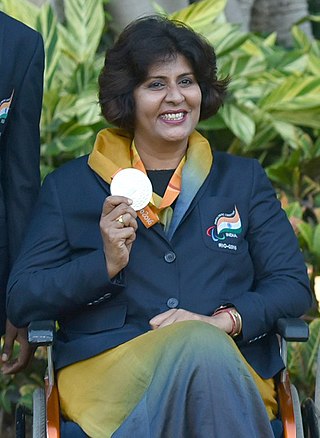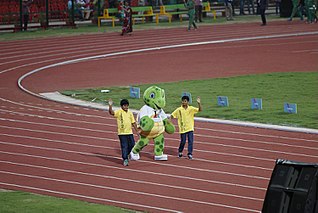
Rajyavardhan Singh Rathore is an Indian politician, Olympic medallist in shooting and retired colonel in the Indian Army. He is serving as a cabinet minister at the Industry & Commerce, Youth Affairs & Sports Department in the Government of Rajasthan since December 2023. Rathore was a Member of Parliament in the Lok Sabha from Jaipur Rural seat since 2014 till 2023.

Abhinav Bindra OLY is an Indian former sport shooter and a businessman. He is an Olympic gold medalist as well as the first and one of only two Indians to win an individual Olympic gold medal. Bindra is also the first Indian to have held concurrently the World and Olympic titles for the men's 10-meter air rifle event, having earned those honors at the 2008 Summer Olympics and the 2006 World Championships. Bindra has won seven medals at the Commonwealth Games and three medals at the Asian Games.

Vikas Shive Gowda is an Indian discus thrower and shot putter. Born in Mysore, he grew up in Frederick, Maryland in the United States. His father, Shive Gowda, coached the 1988 Indian Olympic track team. Vikas Gowda is a Padma Shri awardee in 2017.
Ranjit Bhatia was an Indian athlete and journalist who ran in the marathon and 5000 meters events at the 1960 Summer Olympics in Rome.

Hari Chand was an Indian long-distance runner. In the 1976 Summer Olympics in Montreal, he came eighth in the heats of the 10,000 metre run with a time of 28:48.7. This however was a national record for an Indian athlete and was only beaten 32 years later by Surendra Singh. In the 1980 Summer Olympics in Moscow he came 10th in the heats of the 10,000 meter run. He also came 22nd in the 1980 Olympic Men's Marathon. He ran barefoot in Montreal.

India has a history of sports dating back to the Vedic period, with Western sports having been imported during British rule. Cricket is the most popular spectator sport; it generates the highest television viewership, with the Indian Premier League (IPL) being the most-followed league in the country. Football has also gained popularity, with the Indian Super League (ISL) being the highest level of domestic football, and the national team winning multiple gold medals at the Asian and South Asian Games. Additional football accomplishments include India having reached the Groupstage of the 1960 Olympics, qualified for the 1950 FIFA World Cup, and won the SAFF Championship. Other sports include kabaddi, badminton, tennis, and athletics, with kho-kho becoming the fourth-most viewed sport. India has also had success in field hockey, winning the World Cup and multiple medals in the Olympic Games. Sports such as golf, rugby, boxing, kickboxing, mixed martial arts, motorsport, wrestling, and basketball are featured throughout the country.

Milkha Singh, also known as "The Flying Sikh", was an Indian track and field sprinter who was introduced to the sport while serving in the Indian Army. He is the only athlete to win gold at 400 metres at the Asian Games as well as the Commonwealth Games. He has won gold medals in the 1958 and 1962 Asian Games. He represented India in the 1956 Summer Olympics in Melbourne, the 1960 Summer Olympics in Rome and the 1964 Summer Olympics in Tokyo. He was awarded the Padma Shri, India's fourth-highest civilian honour, in recognition of his sporting achievements.

Randhir Singh is an Indian sports administrator and former sports shooter. Singh is noted as one of India's most influential sports administrators. He has held several positions in both Indian and international sports governing bodies, and also had a successful shooting career before retiring from the sport in 1994. Singh began his sports administration career in 1984, while he was still competing as a shooter.

Sudha Singh is an Indian Olympic athlete in the 3000 metres steeplechase event. A national record holder in the event, she has represented India at international events since 2005. Singh is an Asian Champion in the discipline and has won two gold and four silver medals at varying editions of the Asian Games and the continental championships.
Rajinder Singh Chauhan, also known as Rajinder Singh Jr., is an Indian field hockey player and coach. He was part of the Indian teams that won the silver medal at the 1982 Asian Games, the bronze medal at the 1982 Champions Trophy, and the silver medal at the 1983 Sultan Azlan Shah Cup. He coached the Indian women's team in 2004 and the Indian men's team in 2005-2006.
In India, the Athletics was introduced during the period of the British Raj. The sport is governed by the Athletics Federation of India, which was formed in 1946.

Brigadier Harcharan Singh VSM is an Indian field hockey player. He was a member of bronze medal winner India men's national field hockey team at the 1972 Summer Olympics in Munich.
Ajmer Singh was an Indian sprinter who competed in the 1964 Summer Olympics, was a gold medalist at the 1966 Asian Games, in Bangkok, and later served as Director of Sports, Punjab University, Chandigarh.
Gurmeet Singh is an Indian athlete who competes in the 20 kilometres race walk event. He is a current Indian record holder in the 20 km race walk, which he set in the Indian Grand Prix I in Patiala in May 2011. Gurmeet is sponsored by the Mittal Champions Trust, an initiative run by steel magnate Lakshmi N. Mittal. He is one of the three Indian athletes who qualified for the 2012 Summer Olympics in 20 km race walk event with an 'A' qualification standard (1:22:30). He achieved this berth in the 18th Dublin International Grand Prix in Ireland after finishing sixth with a time of 1:22:05.

Naib subedar Irfan Kolothum Thodi is an Indian athlete and Indian Army junior Commissioned Officer (JCO) from Malappuram, Kerala.

Deepa Malik is an Indian para athlete from Haryana. She is the first Indian woman to win a medal in Paralympic Games. She won a silver medal at the 2016 Summer Paralympics in shot put.

Sports is an important part of the culture of Odisha and plays a key role in development of the state. Field hockey, athletics, association football, cricket, weightlifting, rugby union and rugby sevens are among the most popular sports in the Indian state of Odisha. Odisha is also known as the Sports Capital of India. The Kalinga Stadium in Bhubaneswar and the Barabati Stadium in Cuttack are among the major stadiums in the state.

Subedar Major Neeraj Chopra is an Indian track and field athlete. Considered as the greatest Indian javelin thrower, he's a double medalist at the Olympics, World Championships, and the Asian Games. He has won the Diamond League once. Chopra won the gold medal at the 2020 Olympics, becoming the first Asian javelin throw athlete to do so. He became the first Asian to win a gold in javelin at the World Championships after his win in 2023. Chopra has won gold medals in every major tournament. He has a podium finish streak in 24 consecutive competitions, dating back to 2020. Since his performance at the 2016 World U20 Championship, he continues to hold the junior javelin throw world record.

Khelo India Youth Games are the annual national level multidisciplinary grassroot games in India held in January or February for two categories, namely under-17 years school students and under-21 college students. Every year best 1,000 kids will be given an annual scholarship of ₹5 lakh (US$6,000) for 8 years to prepare them for the international sporting events.

Tajinderpal Singh Toor is an Indian shot putter who is a two-time Asian champion, an Asian Games gold-medallist, four time national champion, the former Asian record holder and the current holder of the national record of 21.77m.














